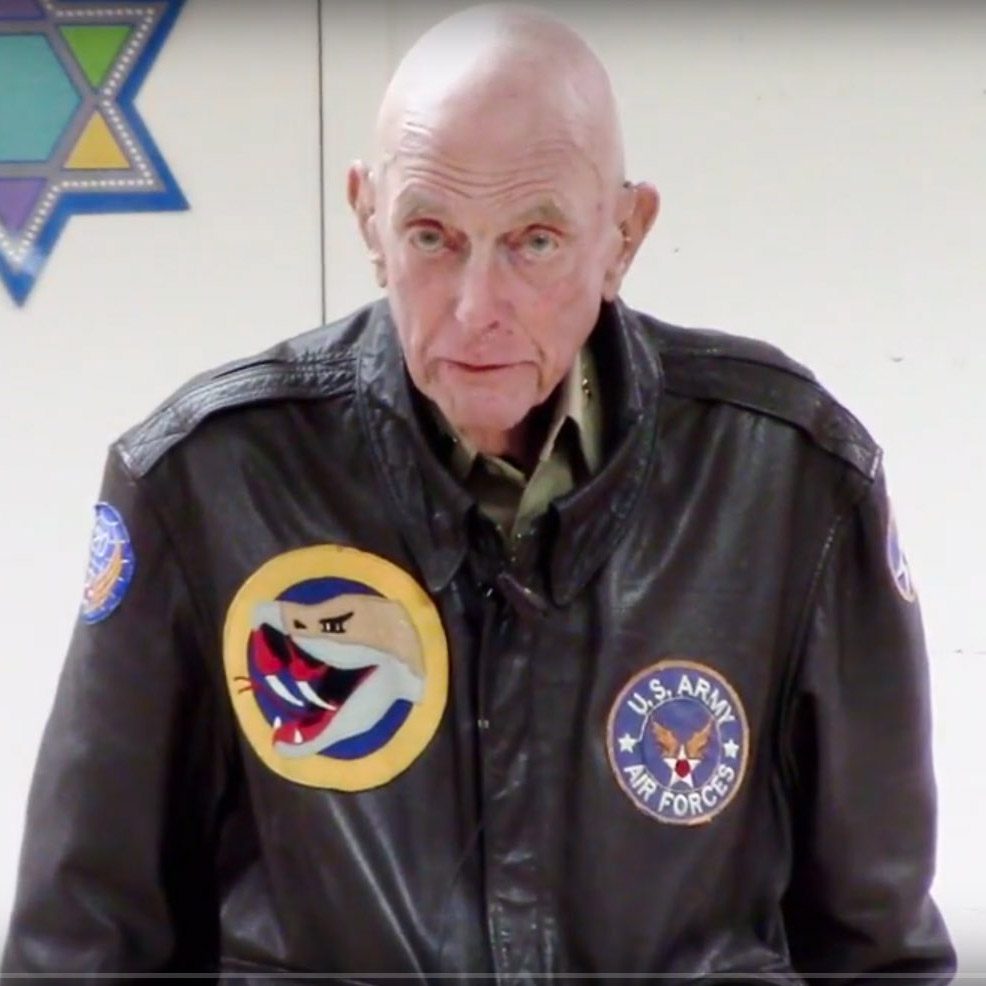Captain Jerry Yellin spoke at the museum on October 25th. It was one of his last speaking engagements before he passed away on December 21st. It was an honor to have him share his incredible story here at the museum which included flying the final combat mission of World War II.
Though he never was a religious man, Yellin made clear that from his Bar Mitzvah to the final mission of WWII, his Jewish identity played an important part of his life. Yellin was a frequent speaker at a variety of venues and his story is well told in several books and articles. But on his visit to our museum, he spoke more about being Jewish than he did in other settings. Jewish experiences impacted his childhood. They affected his experience in war when he was flying a P-51 named for Doris Rosen. Yellin lost his Jewish wingman on a mission after the war had already ended. His Jewish identity brought him to live in Israel in the 1960s. Being Jewish played an important part on much of Yellin’s life.
"The war started in Europe with Hitler killing Jewish people. It ended with two Jewish guys flying the last combat mission. One came home and one was killed."
A young Jerry Yellin didn’t want a Bar Mitzvah, but his mother insisted. Following his bar mitzvah, swastikas appeared on his home. He became isolated from his non-Jewish friends. This would feed his motivation to become the best fighter pilot he could be.
When he was first assigned to train with the 78th Fighter Squadron, the room assignments told him he was different: “[There were] 28 guys. 27 of those guys roomed with other fighter pilots and I was a Jewish guy and they knew that and I roomed with Marvin Kern and Phil Janoski guys who were the Intelligence Division of the 78th Fighter Squadron. I was separated because of my religion. I was not accepted as a fighter pilot until I flew and like the Tuskegee Airmen the black guys who had to be three times as good, just to be even, I had to be three times as good.” Yellin felt he achieved this goal and proved himself as a pilot. Being a part of an airshow for the president helped confirm this belief.
Yellin also had Jewish experiences when stationed in the Pacific. Though he never had much use for religion at home, he spoke of the boost to his morale that a Passover Seder provided in 1945. The matzah and wine on Iwo Jima provided a powerful experience by connecting his wartime life with his Jewish culture.
Yellin summed up the combination of Jewish identity and his own individual war experience this way. “The war started in Europe with Hitler killing Jewish people. It ended with two Jewish guys flying the last combat mission. One came home and one was killed.” His relationship with Phillip Schlamberg, his fellow Jewish pilot who was killed, led to decades of struggling with PTSD following the war. Yellin described learning transcendental meditation many years later to help manage his PTSD.
After the war. Yellin stated he would have liked to continue with the Army Air Forces. But it was antisemitism that kept him from continuing with a career in the military. Yellin felt he wasn’t fully accepted because he was Jewish, and he chose another career path. That postwar career including making a living playing golf. He gambled on the courses of New Jersey. He was good enough to compete in the Maccabiah games and decided to move to Israel in 1965.
Yellin’s World War II experience is a stellar example of the kind of stories we want to tell at the museum. He distinguished himself as a fighter pilot. His final mission was significant, marking the end of the war. His Jewish identity infused all these experiences.
Captain Yellin’s entire talk can be seen on our YouTube channel. May his memory be a blessing.
